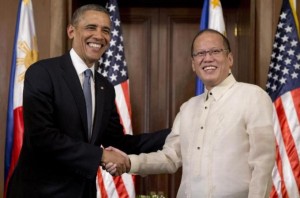Signing of deal during Obama trip raises concern over US influence and impact on Manila’s already strained Chinese ties.
Manila – US President Barack Obama has arrived in the Philippines in a visit widely seen as of a part of Washington’s “pivot to Asia strategy.”
Obama landed just hours after Philippine Defence Secretary Voltaire Gazmin and US Ambassador to the Philippines Philip Goldberg signed a new military agreement allowing more troops in the country.
The Philippine government said the pact is an affirmation “of the robust and enduring strategic partnership between” the two allies.
Talking to reporters in Manila, Goldberg, said that the new agreement will not allow the reopening of US bases in the Philippines, something that has been opposed by nationalist forces and is prohibited by the 1987 Constitution.
But the agreement essentially allows US access to Philippine military bases across the country.
Senator Miriam Defensor-Santiago, chairman of the Philippines Senate Committee on Foreign Affairs, told news agency that the agreement has “marginal advantages” for the the country, and is more beneficial to the US.
With the signing of the agreement, Santiago said the US “could claim that it has ‘contained’ China, because the Asian countries involved, including the Philippines, are now bound by their respective agreements with America”.
“It would make the Philippines sounds as if we are a satellite ally of America,” she said.
Disputes with China
Anti-China sentiments have been on the rise in the Philippines, which is engaged with Beijing over disputed atolls in the potentially oil- and gas-rich South China Sea, with both countries claiming Scarborough Shoal and Second Thomas Shoal as their own.
The Philippines has accused Beijing of becoming increasingly aggressive in staking its claims to the sea, and has called on the US for greater military as well as diplomatic support.
While the treaty is seen to boost Manila’s confidence in countering the Chinese power, Santiago warned that the country must be careful in handling the agreement, and avoid the violation of the Philippines constitution.
“Filipinos should keep uppermost the supremacy of the Philippine Constitution,” she said.
“We should not accommodate any foreign power at the cost of the sovereignty of our Constitution, even if the problem is presented as if it were a problem of national survival.”
Activists opposing what they call “US imperialism in Asia,” raise the question of sovereignty.
They cite a case in 2005 when five US soldiers were initially sentenced to life in prison for allegedly raping a Filipino woman, before the ruling was overturned by another court and they were set free, despite public anger.
Another issue that has spiked contempt is the alleged dumping of toxic waste in the northern Philippines, supposedly by US military ships which Washington denies.
‘Exaggerated threat’
Jose Maria Sison, the exiled leader of the Communist Party of the Philippines, and one of the top opponents of the deal told Al Jazeera that the agreement practically reopens the US bases in the country.
“The US military bases shall be practically re-establlished under the guise of facilities built on Philippine military grounds, with the Filipino military personnel practically serving as perimeter security guards and with the Philippine government sharing the costs,” he said.
Sison also said the the US “is exaggerating the threat of Chinese aggression in order to justify its pivot to East Asia” while establishing bases in the Philippines and “at the same time claiming neutrality between The Philippines and China”.
But he also said that China “is not helping itself by outlandishly claiming about 90 per cent of the entire South China Sea, including its high seas, and threatening to grab 90 per cent of the exclusive economic zone and 100 per cent of the extended continental shelf of the Philippines”.
Speaking to media, Dr Francisco Nemenzo, a political scientist and former president of the University of the Philippines, criticised the negotiators for concealing the details of the agreement.
Nemenzo said the deal “just legitimises what they [the US] have been doing all these years: allowing the establishment of an American base within a Philippine base, which a Filipino commander cannot even enter.
“We want to know if the deal is a blanket agreement, allowing the US to set up a military facility wherever they want to.”
Security around the capital for the two-day visit is tight, including the ordering of a no-fly zone by the Philippine government during the arrival of Air Force Once.





1 Comment
Comments are closed.